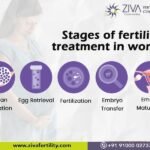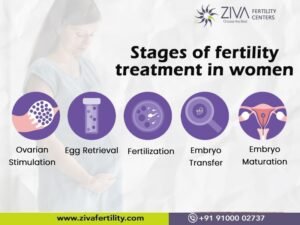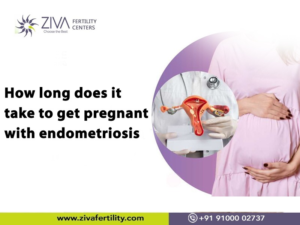Couples opt for In Vitro Fertilization (IVF) for a variety of reasons, the predominant one being fertility issues.IVF is often a preferred option for women with damaged or blocked fallopian tubes. IVF bypasses the fallopian tubes, making pregnancy possible. Couples facing issues with sperm count, movement, or shape may opt for IVF. Techniques like intracytoplasmic sperm injection (ICSI) are used alongside IVF to address male infertility by directly injecting a single sperm into an egg. Conditions that affect ovulation, such as polycystic ovary syndrome (PCOS) or premature ovarian failure, can make natural conception difficult. IVF provides an alternative by allowing for the controlled stimulation of the ovaries. Some couples have all aspects of their fertility deemed normal by healthcare providers but still face difficulties conceiving. IVF offers a chance of pregnancy to these couples. Couples at risk of passing on genetic disorders to their offspring might choose IVF combined with preimplantation genetic testing (PGT). This allows for the selection of embryos that are not affected by the specific disorder. As fertility declines with age, especially in women over the age of 35, IVF can offer a more effective route to pregnancy than natural conception. Couples who have conceived in the past but are unable to conceive again may resort to IVF after other fertility treatments have not been successful. Individuals who need to undergo treatments (like chemotherapy) that might harm their fertility may choose to have their eggs or sperm frozen for use in IVF later. Each couple’s journey to consider IVF is unique and influenced by a range of medical, emotional, and personal factors.
IVF in a nutshell

In Vitro Fertilization (IVF) is a medical procedure used to help with fertility issues or prevent genetic problems and assist with conception. In simple terms, IVF involves combining eggs and sperm outside the body in a laboratory. Once an egg is fertilized by sperm and forms an embryo, it is then placed in the uterus in hopes of a successful pregnancy. This process provides an opportunity for people who might have difficulties conceiving naturally to potentially have a baby.
How to boost your chances of IVF success?

Boosting the chances of IVF (In Vitro Fertilization) success involves a combination of medical treatment, lifestyle adjustments, and emotional support. Here are some strategies that can potentially enhance the likelihood of a successful IVF cycle:
- Maintain a Healthy Weight: Being either underweight or overweight can affect your fertility. Aim for a healthy BMI (Body Mass Index) to improve the chances of IVF success.
- Follow a Balanced Diet: Eating a diet rich in fruits, vegetables, whole grains, lean proteins, and healthy fats can support your reproductive health.
- Stay Hydrated: Proper hydration is essential for a healthy body and can support IVF treatment.
- Take Recommended Supplements: Folic acid, omega-3 fatty acids, vitamin D, and other supplements may improve fertility. However, it’s important to discuss any supplements with your healthcare provider before starting them.
- Reduce Stress: High-stress levels can negatively impact fertility. Mindfulness, meditation, yoga, or therapy can be beneficial in managing stress.
- Avoid Smoking and Limit Alcohol and Caffeine Intake: Smoking can decrease fertility, and alcohol and caffeine consumption may also need to be moderated during the IVF process.
- Exercise Regularly, But Don’t Overdo It: Moderate exercise can boost fertility, but excessive high-intensity workouts may need to be avoided during IVF treatment.
- Get Adequate Sleep: A regular sleep schedule and enough sleep are important for general health and can impact fertility.
- Follow Your Doctor’s Instructions: Adhering to medication schedules, attending all appointments, and closely following your doctor’s advice are critical for IVF success.
- Consider Acupuncture: Some studies suggest that acupuncture may help improve IVF success rates by reducing stress, increasing blood flow to the uterus, and improving the lining thickness.
- Support System: Having a strong support system can help manage the emotional rollercoaster of IVF. This can include friends, family, support groups, or a professional counselor.
- Review and Adjust Treatment Plan as Needed: After each IVF cycle, your doctor may adjust your treatment plan based on what was learned from the previous attempt.

- Post-Embryo Transplant Care: Post-embryo transplant care in IVF, often referred to as post-embryo transfer care, encompasses several steps aimed at maximizing the chances of a successful pregnancy. It involves a combination of lifestyle advice, medical guidelines, and sometimes, emotional support. Key aspects generally include:
- Patients are usually advised to take it easy for a few days post-transfer, although bed rest is not typically recommended as it hasn’t been shown to improve the chances of a successful implantation.
- Medication Adherence: Continuing with prescribed medications, especially progesterone supplements, is crucial. These aid in supporting the uterine lining and enhancing the chances of embryo implantation.
- Follow-Up Tests: Doctors will schedule blood tests to measure hormone levels and check for pregnancy. It’s crucial to keep these appointments to monitor the progress and adjust medications if necessary.
- Symptom Monitoring: Some cramping and spotting can be normal post-transfer, but it’s important to report any symptoms to the healthcare provider for appropriate evaluation.
- Mental Health Support: The waiting period, often referred to as the “two-week wait” until a pregnancy test is performed, can be emotionally challenging. Access to counseling or support groups can be beneficial during this time. Keep in close communication with the fertility care team for support and clarification of any concerns or symptoms experienced.
A word from ZIVA Fertility Clinics
Each person’s situation and IVF journey is unique, so following the specific instructions provided by the fertility clinic or healthcare provider is essential. They can offer tailored advice according to the individual’s health status, the specifics of their IVF cycle, and any other factors relevant to their care. Going through IVF can be an emotionally intense experience. It’s okay to feel hopeful, scared, or even uncertain at times. Remember, there’s no right way to feel, and reaching out for help when needed is a sign of strength. Always keep your healthcare team informed about any concerns or side effects you experience, as they’re your primary resource for advice tailored to your specific situation. For more information please visit our website https://zivafertility.com/ or contact us at 919100002737, +919347406900, info@zivafertility.com.
















